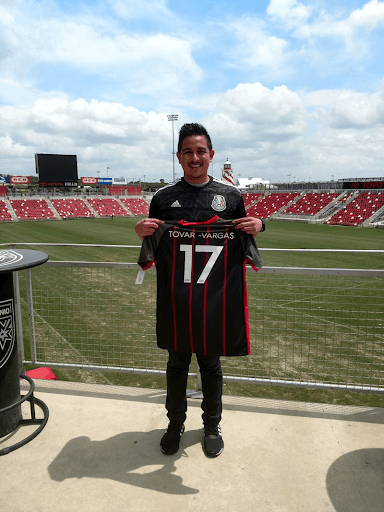Businesses say college isn’t preparing graduates for work: why not, and chiefly, what are burgeoning professionals to do?
NEW sat with current apprentice, Christian Tovar-Vargas, to hear his attraction to the New apprenticeship, as he closes his own learning gap from student to professional.

What were university career counselors telling you about jobs after graduation?
“Being first-gen, my idea of a college experience and the job market were extremely foreign: I had no idea! I just knew, “I go to college, I get a college degree, maybe I make it to ESPN someday.” I wanted to be involved in sports broadcasting and was set on the idea of being a newscaster or sports broadcaster, working for ESPN, and having my own show. But I was dissuaded because of the amount of money I could make. And being first-gen, obviously, it’s very important that you make money: it’s a lot higher on the value-chain, coming from that background. So, that led me to take a step forward and do social science— Psychology, which is really important to me now, because it helps me see things from a different lens within my marketing role.”
But it wasn’t Christian’s passion. He longed to be involved in sports. Working with sports teams in San Antonio he experienced public relations, social media, and event management but needed more.
“I decided to pivot and add a sports management minor: still got my psychology degree, still did the sports psychology research, but made it a focus to get sport management experiences. I knew I needed more experience, contacts, and a leg-up in the industry, so I decided to pursue graduate school.”
Leaving his graduate program, after volunteering and interning, unpaid, he experienced burnout and a desire to actually make money, soon realizing where schooling failed to prepare him.
“During the Covid time period, I had gone back [to being] a personal trainer. As restrictions eased, I kept not getting enough clients. None of my clients wanted to come train: no one really wanted to come train. And I’m over here, Greg, I’m like, “I got all this great knowledge: I can help so many people, and no one seems to want to listen.” I found New Apprenticeship because I wanted to figure that out, and I knew that marketing, if I could understand the practice of efficient marketing, was going to help that fundamental issue.”
In each of his sports industry roles, getting clients was always the challenge:
“When I worked in college athletics, getting students in the doors is tough— they got a party to go to, work, or whatever. With our soccer team, San Antonio FC, there was always the question: how can we get this place sold out? And with the gym: how many people can I get in the door? They always had that one question of wanting to understand: why are we not getting “X people” in the door? How can we get more revenue through the door?”

Is that why you found New Apprenticeship?
“I have this really strong analytical background— kind of a problem-solver-background, and that’s how I landed in digital marketing. It’s kind of this perfect marriage of creativity and an analytical mind—from the psychology: the research. Analytical skills are what they’re missing, and that, that is one of the biggest things that you get out of New Apprenticeships: learning how to convert I’ve-got-a-gut-feeling-about-this into “No; I looked at the data, and I understand how to dig in and really understand what’s working and what isn’t.” New Apprenticeship really helped fill the gap for me.”
Christian had dabbled in sports marketing during his internships but lacked the specific skills to market his own brand.
“The ultimate goal for me is: to take what I’ve learned so far with New Apprenticeship and apply that to a fitness marketing role. I would be very candid and say I had absolutely little digital marketing experience. I was very candid about it from the start, and I think that vulnerability really helped me out a lot, because I was then able to ask The Questions. This is something I picked up in college: “what do I need to do to get it right?”
His experience is a common one: you too may have a great set of skills that aren’t quite fully hatched and ready to launch. New Apprenticeships can help.
“The beautiful part about New Apprenticeship is: they come in with all of these tools, all of these connections, and a curriculum that is extremely impactful because as I was going through the process, I was picking up skills employers were looking for. What NEW does very well, very quickly, is give you tools, super-fast, and makes it super-impactful for you with the projects they do. Now, I’m able to do two things: one, I can [either] go into [jobs] in the industry, or I can create my own things, go to organizations with a plan, and say, “Hey, here’s a way that you can generate awareness.” When I got the role I’m in, I’ve never been more confident in my abilities.”
Tell us about that role: How’s it working for you?
“Yeah, so, I’m working as a marketing coordinator, right now, for a marketing agency here in San Antonio, and it’s working out really well for me because I get to add value but also learn a lot. The concept of lead generation, of using Pardot, of doing market research was foreign to me when I started the program. But through that process, I’ve felt super-prepared: the way the apprenticeship program is layered so far has helped me out a lot because it connects directly to what I’m doing. I’m trying to get leads, and everything that I’ve learned so far, from inbound marketing, Google Analytics, content marketing, and now, social media, is directly helping me do it.”
Combining Work Experience + Apprenticeship adds value to both.
“A cohort-mate is trying to grow her company’s social media, right? We took a look at her website and immediately, using what I’ve learned in class, said, “Well, it doesn’t seem like you’re really generating awareness and there’s no call to action.” Taking what I’ve learned in class and what I’ve seen at work and providing some impactful insights to help out a cohort-mate, [who is] now able to go to her organization and provide value using what she learned collaboratively, you know, that’s great!”
New Apprenticeship allows you to understand the WHY of your work tasks and add value.
“Putting strategy behind content: that’s another thing that we’re working on, right now, with Google Analytics— being empowered to track, report, analyze, and explain it to stakeholders. It’s very important to them. I think putting a problem-solving hat on is something I’ve noticed [lacking]. If people really flesh that out, I think it would help them out a lot, and that’s what I’m here for.
In addition to the technical skills, I think NEW really hits home on the concept of connection: finding a connection with whoever you’re talking to. This concept applies overall as you’re looking for a role and about to interview with someone. You’re gonna have to find a way to connect with that person, because that can turn a conversation completely on its head, you know?”
I’ve heard you say New Apprenticeship teaches people how to develop analytical skills, to connect with people, to give presentations, to interview well, and how to understand things from a customer and EMPLOYER perspective: what else?
“The biggest thing I would say is: they give you, like, an insider’s track to being successful. When I talk about New Apprenticeship, I say: they provide you with the skills, both hard and soft, to get you into the tech industry— whether that’s digital marketing or data analytics. If they get you, they got you covered, with everything: the technical skills to get you through that pile of resumes, and the soft skills, so that you can ace the interview, get yourself a job, and, even better, they go a step further, giving you the professional guidance to be an all-star! They have a proven system for success. And, I mean, I’m here as a person who literally had no digital marketing experience, now working for a marketing agency: I just trusted the system— ‘hashtag, trust-the-process.’”

#TrustTheProcess
